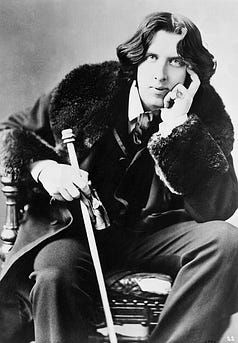|
 |
The Writer's Almanac from Monday, October 16, 2017
“Because the Night You Asked” by Crystal Spring Gibbins from Now/Here. © Holy Cow! Press, 2017.
ORIGINAL TEXT AND AUDIO - 2017
It’s the birthday of American playwright Eugene O’Neill, born in a Broadway hotel room in New York City (1888). His father was a famous actor, and O’Neill spent much of his childhood on trains and in hotels, following his father on tours. He went to Princeton, but he was expelled after a year. He got a series of odd jobs, then went off on a gold prospecting expedition in Honduras, where he contracted malaria. After he recovered, he tried out sailing, vaudeville acting, and writing for a small-town newspaper. In 1912, he fell sick again with tuberculosis and spent six months in a sanatorium. While he was there, he began to read classic playwrights and modern innovators like Ibsen and Strindberg.
When he was released, he began writing furiously, coming out with 11 one-act plays in just a few years. In 1916, in Provincetown, Massachusetts, he fell in with a group that would become known as the Provincetown Players, which included writers like Susan Glaspell and Robert Edmond Jones. The group began producing O’Neill’s plays on a regular basis, and they helped to revolutionize American theater.
In 1920 his play Beyond the Horizon became a popular and critical success on Broadway, and it won the Pulitzer Prize. He would go on to win two more Pulitzers in the next eight years, for Anna Christie (1922) and Strange Interlude (1928). He continued to write until 1944, when he was diagnosed with a crippling neurological disease called cortical cerebellar atrophy. In 1956, his work began to be revived, and his play Long Day’s Journey into Night — published posthumously in 1956 — won the Pulitzer Prize the next year.
After Shakespeare and Shaw, O’Neill is the most widely presented and translated dramatist in the English-speaking world. His were the first real tragedies of the American stage, the first to dispense with formal language in favor of slang, and the first to use special effects like masks and dramatic lighting. He won the Nobel Prize in 1936.
O’Neill wrote to a friend: “I am far from being a pessimist. … On the contrary, in spite of my scars, I am tickled to death at life!”
And he wrote, “Life is for each man a solitary cell whose walls are mirrors.”
It’s the birthday of Irish writer Oscar Wilde, born Oscar Fingal O’Flahertie Wills Wilde, in Dublin (1854). He’s the author of the plays Lady Windermere’s Fan (1893), A Woman of No Importance (1893), and The Importance of Being Earnest (1895); and he’s one of the most quotable authors in the English language.
His mother was a famous poet, journalist, and Irish nationalist; his father was a noted ear and eye doctor. He went to college at Oxford, where he began affecting an aristocratic English accent and dressing in eccentric suits and velvet knee breeches.
He stayed in England after college and made a name for himself as a brilliant conversationalist in the high society of London. A movement in art and literature called Aestheticism was becoming popular at the time, and Wilde became known as one of its leading spokesmen. The movement’s motto was “Art for art’s sake.” Wilde began lecturing on the importance of art and beauty in people’s everyday lives. He said: “We spend our days looking for the secret of life. Well, the secret of life is art.” And he said, “Even a colour-sense is more important, in the development of the individual, than a sense of right and wrong.”
Wilde went on a sweeping lecture tour in the United States, stopping everywhere from Des Moines to Denver, from St. Paul to Houston. He visited Walt Whitman in Pennsylvania, where they drank elderberry wine and talked about poetry in America and England. He lectured to rich people and to coal miners. He said, “The most graceful thing I ever beheld was a miner in a Colorado silver mine driving a new shaft with a hammer.”
Soon after he returned to London in 1883, he set himself to writing poetry, plays, and essays. But he didn’t become well known as a serious writer until he came out with his first and only novel, The Picture of Dorian Gray, in 1891, about a beautiful young man who remains young while a portrait of him grows old. Wilde then burst upon the British theater scene with four consecutive comedy hits: Lady Windermere’s Fan (1893), A Woman of No Importance (1893), An Ideal Husband (1895), and The Importance of Being Earnest (1895).
Be well, do good work, and keep in touch.®
CLICK HERE to order Cheerfulness by Garrison Keillor.
You’re a free subscriber to The Writer's Almanac with Garrison Keillor. Your financial support is used to maintain these newsletters, websites, and archive. Support can be made through our garrisonkeillor.com store, by check to Prairie Home Productions P.O. Box 2090, Minneapolis, MN 55402, or by clicking the SUBSCRIBE button. This financial support is not tax deductible.


